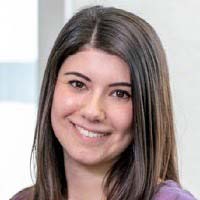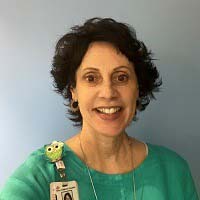Childhood Cancer Awareness Month: Expert Interviews & an Advocacy Guide
Counseling Schools Search
When you click on a sponsoring school or program advertised on our site, or fill out a form to request information from a sponsoring school, we may earn a commission. View our advertising disclosure for more details.
“Ultimately, children diagnosed with cancer are some of the most inspirational people I have met. These children may face challenges every day, but the way they cope and manage those challenges as they arise is incredible.”
Lauren Chatalian, MSW, LCSW, CancerCare’s Women and Children’s Program Manager
Cancer is the leading cause of death by disease for children in the US. Each year, an estimated 15,780 children across the country are diagnosed with cancer, and an average of 40,000 children in the US are in active cancer treatment at any given time; approximately 20 percent will not survive it. At a global level, a child is diagnosed with cancer every three minutes, and an estimated 180,000 more cases go undiagnosed yearly.
Psychosocial issues are a critical consideration when treating childhood cancer. According to the American Psychological Association (APA), counselors, social workers, psychologists, and other mental health professionals can help children and their families overcome trauma and boost resilience during what is often a multiyear treatment process; they also help families communicate effectively with medical staff, and connect them to other available resources.
September is Childhood Cancer Awareness Month. Recognized by childhood cancer organizations worldwide, its goal is to increase awareness and raise funds for those affected by childhood cancer. It’s also an opportunity to recognize the crucial support that counselors, psychologists, social workers, and other professionals provide to children with cancer, and the families of those children.
Read on to learn more about how counselors work with childhood cancer patients.
Meet the Experts: Lauren Chatalian and Michelle Fritsch

Lauren Chatalian, MSW, LCSW
Lauren Chatalian is CancerCare’s Women and Children’s Program Manager and Directory of Advocacy. As an oncology social worker at CancerCare, Chatalian provides supportive services to individuals and families impacted by a cancer diagnosis, and coordinates programmatic activities and outreach related to the Women’s Cancers Program and CancerCare for Kids.
Chatalian also participates in local and national presentations, workshops, and advocacy boards. She is a member of the National Association of Social Workers (NASW) and the Association of Pediatric Oncology Social Workers (APOSW).

Michelle Fritsch, LMSW-ACP
Michelle Fritsch is the project coordinator at Texas Children’s Cancer & Hematology Centers. Currently, she assists families and staff to identify educational resources and information about supportive resources in pediatric hematology and oncology. She is actively involved in several quality-improvement initiatives and leads the Family Advisory Support Team for the Centers.
Fritsch is the President of the Association of Pediatric Oncology Social Workers (APOSW). She developed a guidebook of local, national, and online resources that are available to patients and families who are facing a cancer or blood disorder diagnosis.
Please note that both experts were interviewed in 2021.
How Counselors, Social Workers, and Psychiatrists Work with Childhood Cancer Patients and Their Families
“Counselors work with children diagnosed with cancer by providing psychosocial support,” Chatalian says. “This may include coping with the initial diagnosis and extending throughout treatment as well as post-treatment (and long-term side effect) concerns. Counselors may focus on the practical concerns related to one’s diagnosis, as well as the emotional impact a cancer diagnosis can have on a child.”
Common adult cancers, such as lung cancer, breast cancer, and colon cancer, are rare in children. But childhood cancer can still come in many forms, including osteosarcoma, hepatoblastoma, and neuroblastoma. Childhood cancers also tend to be more aggressive, and require a multidisciplinary team of specialist staff. The most common childhood cancer is leukemia, accounting for nearly 28 percent off all pediatric cancer.
Counselors, social workers, psychiatrists, and other mental health professionals working with childhood cancer patients need to consider different factors than those working with adult cancer patients.
“Children with cancer are a unique group, as they come with several clients, including the patient, siblings, parents, and extended family,” Fritsch says. “When counseling a child you must take into account the entire family dynamics, the age of the child, and a host of other factors. Oftentimes you will need to counsel via games, and have discussions that are not a ‘typical’ counseling scenario.”
Both Fritsch and Chatalian emphasize the importance of understanding the psychological, social, and emotional impacts a cancer diagnosis can have on a child and their family. The side effects of medical treatment can stretch beyond the physical to include long hospital stays and separation from peers. For some children, a cancer diagnosis and the resulting treatment can represent their first encounter with the hospital setting; counselors, social workers, and psychiatrists can help them manage feelings of fear and uncertainty.
“Working through traumatic events and loss, establishing beneficial coping mechanisms and relaxation techniques, identifying feelings and determining ways to express those feelings, and dealing with self-esteem and body image all can be areas of focus throughout counseling,” Chatalian says.
Emerging Research and Best Practices in Counseling Children With Cancer
“There is an increasing amount of research on the importance of following a family from start to finish, whether the child is inpatient or outpatient,” Fritsch says. “By starting from the beginning and developing a rapport with the family, the social worker is in a unique position to work with the family on a variety of needs, including community assistance, travel accommodations, referrals to support in their area, counseling, school assistance, scholarships and more.”
Many childhood cancer survivors have long-term side effects from their treatment, such as heart problems, fertility challenges, hearing loss, vision complications, or hormonal issues. As Chatalian describes in a 2018 article for Oncology Nurse Advisor, chemotherapy might also result in cognitive dysfunction or deficits; approximately a third of childhood cancer survivors experience what is commonly known as chemo brain, which manifests in attention and concentration difficulties, reduced processing speed and executive function, and compromised short-term memory.
“As they reintegrate back into school, a child may be experiencing many adjustments and additional challenges,” Chatalian says. “When speaking to families, I encourage parents to contact school personnel to discuss if an Individualized Education Plan, or 504 Plan, may be helpful. If a child is starting at a new school, or if it has been quite some time since they were in school, a classroom/school visit may help to ease this transition.”
“Alex’s Lemonade Stand has a wonderful resource for families and classmates regarding school and childhood cancer,” Fritsch says. “In addition, there is a resource called Monkey In My Chair, which assists in the school reentry process. Their monkey and school reentry backpack are for preschool- and elementary-aged children who are away from school because of a cancer diagnosis, and the program helps to educate the classmates regarding the child’s medical diagnosis and to keep the child connected with the class.”
Confronting the Challenges of Childhood Cancer
The challenges of childhood cancer are many. Obtaining adequate federal and state funding for research and treatment is always an issue, and comprehensive insurance coverage is a major point of advocacy. Organizations like ACCO are pushing for more acknowledgment and support for childhood cancer patients, their families, and the mental health and medical communities that serve them.
The National Comprehensive Cancer Control Program (NCCCP) mandates each state to publish a Comprehensive Cancer Control Plan, which identifies how each state addresses the burden of cancer in its geographic area.
But the plan lacks a requirement for childhood cancer to be included within that framework, which often leads to it being overlooked; only 29 state plans specifically mention childhood cancer. The ACCO and other advocacy organizations believe each state plan should include specific language regarding childhood cancer, research, treatment, psychosocial standards of care, and issues related to adult survivors of childhood cancer.
Counseling childhood cancer patients and their families can, at times, take its own mental toll. Counselors, social workers, and other mental health professionals working in this area may need to create their own supportive network, both inside and outside of work. To balance the heavy workload that takes place throughout the day, focusing on self-care and emotional outlets can help reset oneself. But for social workers like Chatalian and Fritsch, their job isn’t a burden—it’s a source of inspiration.
“Ultimately, children diagnosed with cancer are some of the most inspirational people I have met,” Chatalian says. “These children may face challenges every day, but the way they cope and manage those challenges as they arise is incredible.”
For many people, childhood cancer is something that they’d simply rather not think about. Fortunately, there are counselors, social workers, psychiatrists, and other professionals working toward the goal of no child dealing with cancer alone.
“I know this may sound hokey, but I get so much out of working with these families,” Fritsch says. “Walking alongside a family that has no other choice than to step up and deal with this lemon that life has thrown them is awe-inspiring. Families bond together, communities provide support, and kids still ride big wheels down the halls of the hospital. Kids are kids no matter the circumstance. Yes, I get sad sometimes and question why things happen. But at the end of the day, I feel pride in getting to work with these amazing families.”
Resources for Childhood Cancer Awareness Month
To learn more about how counselors, social workers, psychologists, and other mental health professionals work with childhood cancer patients, and to find out what types of support are available for people dealing with childhood cancer, check out some of the resources below.
- American Childhood Cancer Organization (ACCO): Founded in 1970 by parents of children and adolescents diagnosed with cancer, ACCO is the nation’s oldest and largest grassroots organization dedicated to childhood cancer. A powerful advocate for families affected by childhood cancer, ACCO has helped support more than 500 million families since its inception.
- Association of Pediatric Oncology Social Workers (APOSW): APOSW is a group of passionate professionals focused on enhancing the lives of children with cancer, and the families who care for them. They accomplish this by advancing pediatric psychosocial oncology care through clinical social work practice, research, advocacy, education, and program development.
- CancerCare: CancerCare is a national non-profit organization providing free, professional support services and information to help people manage the emotional, practical, and financial challenges of cancer. CancerCare for Kids focuses on childhood cancer specifically and offers support to any child impacted by cancer, whether it’s a pediatric diagnosis or the diagnosis of a parent or loved one. Counselors can also contact CancerCare social workers to assist in providing cancer-focused support to their clients.
- Texas Children’s Hospital: With one of the largest pediatric cancer and hematology centers in the US, Texas Children’s Hospital provides individualized, state-of-the-art medical treatment for patients with childhood cancer and blood disorders. Their family support guide links all the resources available to families fighting childhood cancers and blood disorders.

